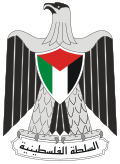| 2nd Palestinian Legislative Council | |||||
|---|---|---|---|---|---|
| |||||
 | |||||
| Overview | |||||
| Legislative body | Palestinian Legislative Council | ||||
| Meeting place | Ramallah | ||||
| Term | 25 January 2006 – 22 December 2018 [a] | ||||
| Election | 2006 Palestinian legislative election | ||||
| Palestinian Legislative Council | |||||
 | |||||
| Members | 132 | ||||
| Speaker | Aziz Dweik | ||||
| First Deputy Speaker | Ahmad Bahar [b] | ||||
| Second Deputy Speaker | Hasan Khreisheh | ||||
| Prime Minister | Ismail Haniyeh (2006–2007) Salam Fayyad (2007–2013) Rami Hamdallah (2013–2019) | ||||
| Party control | Hamas | ||||
| Sessions | |||||
| |||||
 |
|---|
Officeholders whose status is disputed are shown in italics |
| |
The 2nd Palestinian Legislative Council (PLC) served as the legislature of the Palestinian Authority, established following the 2006 legislative election, in which 132 members were elected on 25 January 2006. The PLC was intended to operate for a four-year term, with its mandate set to conclude on 25 January 2010 as per the Basic Law. [1]
Contents
- Votes of confidence in the Council of Ministers
- Bureau of the Council
- Composition
- List of members
- Members elected by plurality block voting
- Members elected by party-list proportional representation
- Notes
- References
The Council held its first meeting on 18 February 2006, where Aziz Dweik was elected as Speaker. However, it ceased to function in plenary sessions after the Hamas takeover of the Gaza Strip and the subsequent dismissal of the Hamas-led Second Haniyeh Government by the President of the Palestinian National Authority Mahmoud Abbas on 14 June 2007.
On 28 March 2006, the Palestinian Legislative Council held a vote of confidence for the First Haniyeh Government, led by Ismail Haniyeh of Hamas, following Hamas' victory in the 2006 election. After a year of political tensions and negotiations which led to the Fatah–Hamas Mecca Agreement, the Second Haniyeh Government, a National Unity Government, was approved by the PLC, though nearly one-third of its members were absent from the session. Following the dismissal of the cabinet by President Mahmoud Abbas, he appointed Third Way co-leader Salam Fayyad as Prime Minister. However, Fayyad's government was unable to secure a proper vote of confidence, as both Fatah and Hamas boycotted the parliamentary session in Ramallah on 22 June 2007. [2] None of the subsequent governments received the required vote of confidence from the Palestinian Legislative Council, as mandated by the Basic Law, and were instead established through presidential decrees.
On 22 December 2018, the Palestinian Legislative Council was officially dissolved by Abbas, following a ruling by the Supreme Constitutional Court, which also called for elections for the 3rd PLC to be held within six months from the date of publishing the decision in the Official Gazette. [3] [4] However, Hamas, which has controlled the Gaza Strip since 2007, rejected the legitimacy of the dissolution, [5] [6] and no new elections have been held since.
The terms of all PLC members officially ended with the council's dissolution, but the legitimacy of this action remains contested due to the ongoing political division between the West Bank, governed by the Palestinian Authority, and the Gaza Strip, controlled by Hamas.


